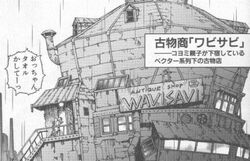| Wabi-Sabi Antiques | |
|---|---|
 Wabi-Sabi Antiques in Phase 12. | |
| Affiliations | Vector |
| Part of | Scrapyard |
| Type | Antique shop |
| Debut | Phase 12 |
Wabi-Sabi Antiques, known in Japan as Wavisavi (ワビサビ Wabisabi?), is an antique shop located in the Southern District of the Scrapyard that is a Vector franchise. It has many artifacts from the pre-Geo Catastrophe era and is managed by an unnamed shopkeeper of Chinese descent. In Last Order Koyomi and her father are boarding here.
History[]
Following Master's surgery to his legs that were broken after he caught Koyomi when she was dropped by Den, she was to have been sold to pay for the costs. However Vector intervened to prevent this from happening and gave them a place to stay out of gratitude for Koyomi saving him from being killed by the Barjack on Den's orders a year before.[1]
Plot[]

Koyomi brings Kaos to Wabi-Sabi in Phase 12.
In ES 591 Koyomi took Kaos to Wabi-Sabi after finding him collapsed on the street following an automobile accident. The shopkeeper recognized him and revealed that he had witnessed Kaos meet with Vector a year before with a plan for the Tower of Tiphares. Vector however reacted violently to Kaos' proposal and after his men beat Kaos up, had a pillory placed on him, telling him to return in a year to test his conviction. Kaos' katana and the blueprints for the Tower of Tiphares also made their way to the shop and were returned to Kaos.
It is not specified if Kaos continued to stay at Wabi-Sabi after he regained his sense of purpose by "reading" a paper airplane that Alita had thrown from Tiphares with his psychometry or began to stay at Vector's.
A few months later on the eve of the Tenth Zenith of Things Tournament Finals, the Combat TV broadcast was hijacked by Nova X and relayed to the Scrapyard. The shopkeeper was watching it when he was joined by Master, who got out of bed and revealed that Alita had used to sing in his bar.[2]
Trivia[]
Its name is taken from wabi-sabi, a comprehensive Japanese world view or aesthetic centered on the acceptance of transience.
References[]
Template:Scrapyard